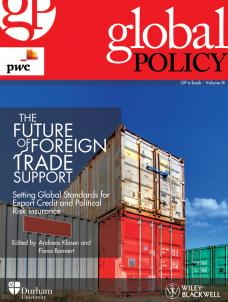
Global Policy's third e-book gathers thirty eight contributions from academics, business and civil society leaders to explore how will government support for foreign trade look in the future, and how rules and regulations for officially supported export credits regarding ethics, human rights and the environment may impact growth, exporters and trade?
Creating growth through trade is an important part of the policy approach of many economies. For decades, many member countries of the Organisation for Economic Co-operation and Development (OECD) have cooperated in a fair competition for the benefit of their national exporters. The countries’ official export credit agencies (ECAs) have established and jointly improved rules and regulations for export credit and political risk insurance. However, new players such as China, Russia or other fast developing countries have now joined the list of top exporting nations. As these countries have established their own ECAs, there is a need to introduce rules and regulations on global standards for financial terms as well as truly international norms ensuring ‘ethical’ trading behaviour. But how will government support for foreign trade look like in the future? Will global standards for export credit and political risk insurance become reality by 2020? And how will strict rules and regulations for officially supported export credits and FDI regarding ethics, human rights and the environment impact growth through trade in general, or exporters in particular?
These are questions addressed by the thirty eight contributions to Global Policy’s third eBook entitled ‘The Future of Foreign Trade Support – Setting Global Standards for Export Credit and Political Risk Insurance’, guest edited by Andreas Klasen (Professor of International Business at Offenburg University and Honorary Fellow in the Global Policy Institute at Durham University) as well as Fiona Bannert (Senior Consultant at PwC’s Economics & Policy Practice).
To get the free ebook, please click here.
Contents:
Glossary
INTRODUCTION
Andreas Klasen and Fiona Bannert – The future of foreign trade support
SECTION I - ECONOMIC DEVELOPMENT AND FOREIGN TRADE SUPPORT
1. David Drysdale - Why the OECD Arrangement works (even though it is only soft law)
2. Erdal Yalcin - New challenges for state-backed international trade finance
3. Ralph Lai - Export credit agencies in the short-term credit insurance space
4. Nigel Taylor - Foreign trade and the aircraft manufacturing industry
5. Pekka Karkovirta - Building international rules for financing export credits
6. Hayrettin Kaplan - Inclusivity and cooperation based approach: Will it succeed?
7. François de Ricolfis - Maintaining the relevance of the OECD Arrangement: A multifaceted agenda
SECTION II - PAST ACHIEVEMENTS AND FUTURE CHALLENGES
8. Dominic Coppens and Todd Friedbacher - A tale of two rules: The intersection between WTO and OECD disciplines on export credit support
9. David Godfrey - Level playing field for global ECAs: Glints on the far horizon
10. Michal Ron and Alessandro Terzulli - Regulations, subsidies and ECAs - Are we sure the more the merrier?
11. Xavier Laurent - The future of foreign trade support: The era of uncertainty
12. Johannes Schmidt- Standardising export credit in the post crisis environment
13. Peter Luketa - Foreign currency denominated loans in today's ECA world
SECTION III - EMERGING ECONOMIES
14. George Otieno - International business and corporate social responsibility - The view from Africa
15. Banu Demir - Global standards on government-backed trade finance: Challenges for developing countries and the role of multilateral development banks
16. Geetha Muralidhar - Inclusive export credit standards
17. Jarmo T. Kotilaine - Supporting export diversification in the Gulf Cooperation Council
18. Karim Nasrallah - Being "Trade Ready" in the MENA region - A key issue for the development and standardization of trade credit and political risk insurance
19. Pedro Pessoa Carriço - Export credit finance: Working towards disciplined competition in a multipolar world
SECTION IV - ETHICS AND SUSTAINABILITY
20. Bert Bruning - What do Maslow’s “hierarchy of needs”, corporate social responsibility and export credit agencies have to do with each other? More than you think!
21. Andrea Saldarriaga and Andrea Shemberg - Achieving global rules on social impacts for export credit agencies
22. Edith P. Quintrell and Kate Wallace - Improving project outcomes through sustainability standards
23. Karin Apelman and Karl-Oskar Olming - Harmonized sustainability requirements in global trade and export finance: A win-win scenario
24. Caspar von Hauenschild - Export credit agencies of the future: Transparent, open and innovative drivers of global development
SECTION V - EXAMPLES OF HARMONISATION
25. Dan Riordan - Future harmonisation in global export credit and investment insurance
26. Marc Auboin - Basel III: Recent developments on the prudential regime affecting trade and export finance
27. Oliver Wieck - Securing commercial transactions based on international ICC standards
28. Sébastien de Brouwer - Preserving the financial infrastructure for trade
29. Markus Wohlgeschaffen - Do we need standards for trade (finance) business? Yes, we do!
30. Hans-Jörg Schmidt-Trenz - Globalisation and governance – Old questions, new answers?
31. Steven Beck - Trade growth needs greater global harmonisation, also among banks
SECTION VI - SETTING GLOBAL STANDARDS IN THE FUTURE
32. Antonio Fernández-Martos - Some reflections on the future of foreign trade support
33. Stormy-Annika Mildner and Richard Bartel - German industry needs a level playing field in export finance
34. Edna Schöne - Sustainable ECA business – An irreversible global trend
35. Jan Vassard - A global regime for export credits in the new world (dis)order – Challenges of multipolarity
36. Fred Hochberg - Increasing competitiveness calls for greater transparency
CONCLUSION
Andreas Klasen and Fiona Bannert - The future of foreign trade support
Citation: Klasen, A and Bannert, F. 2015. The Future of Foreign Trade Support: Setting Global Standards for Export Credit and Political Risk Insurance. London: Global Policy.